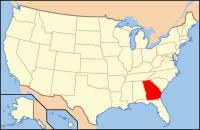Chattooga County, Georgia
| Chattooga County, Georgia | |
|---|---|

Chattooga County Courthouse
|
|
 Location in the U.S. state of Georgia |
|
 Georgia's location in the U.S. |
|
| Founded | 1838 |
| Named for | Chattooga River |
| Seat | Summerville |
| Largest city | Summerville |
| Area | |
| • Total | 314 sq mi (813 km2) |
| • Land | 313 sq mi (811 km2) |
| • Water | 0.2 sq mi (1 km2), 0.07% |
| Population (est.) | |
| • (2015) | 24,922 |
| • Density | 83/sq mi (32/km²) |
| Congressional district | 14th |
| Time zone | Eastern: UTC-5/-4 |
Chattooga County is a county located in the northwestern part of the U.S. state of Georgia. As of the 2010 census, the population was 26,015. The county seat is Summerville. The county was created on December 28, 1838.
Chattooga County comprises the Summerville, GA Micropolitan Statistical Area, which is included in the Rome-Summerville Combined Statistical Area.
Summerville is the site of the Chattooga County Courthouse. The county is home to several properties listed on the National Register of Historic Places listings in Chattooga County, Georgia.
Chattooga county is named for the Chattooga River, which flows through it. It was originally settled by the 'mound builder' culture. A few small mounds can be found throughout the Alpine and Menlo areas. Sometime in the pre-European settlement era, the county was settled by at first the Creek Native Americans and later the Cherokee Native Americans. The principal Cherokee towns in Chattooga were Rivertown (Trion) and Broomtown in Shinbone valley. With the onset of European settlers and after gold was discovered in northern Georgia, the federal government forcibly removed the Cherokees to Oklahoma from Chattooga county in the early 1830s in what has become known as "the Trail Of Tears." In this removal, thousands of Native Americans died from sickness, hunger and abuse. The land was then divided amongst white settlers in the Cherokee Land Lottery of 1832. The Lottery transformed Chattooga into a thriving agricultural area in the antebellum South with farms of varying size dotting the fertile landscape of the Chattooga Valley.
The coming of the American Civil War saw Chattoogans polarized into pro and anti-union camps. Confederate armies received five regiments from Chattooga. Several engagements were fought in the county prior to the battle of Chickamauga. General Nathan Bedford Forrest fought an engagement near Alpine with Federal cavalry resulting in the Federals being thrown back to the Chattanooga area. The largest single engagement in Chattooga was the "Battle of Trion Factory," fought on Sept. 15th, 1863 on present day First Street near the site of the East Trion Church of God. Confederate Infantry forces under the command of General Benjamin Hardin Helm and cavalry under the command of Gen. Joseph Wheeler defeated Union forces in a running battle that started somewhere near Summerville and ended in Trion. The front section of the Old Trion Cemetery on First Street contains the remains of fifty-five Union soldiers and seven Confederates killed in this action, but the graves are unmarked.
...
Wikipedia
